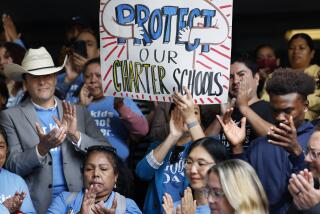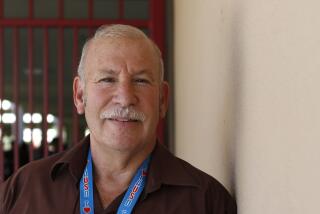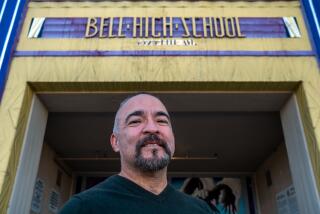Turning the city of L.A. into a classroom
Under the Los Angeles city charter, the mayor has no formal power over the Los Angeles Unified School District. But this has not stopped mayors — including Richard Riordan and Antonio Villaraigosa — from using the bully pulpit and the power of office. With his recent appointment of veteran Superintendent Thelma Melendez de Santa Ana as his deputy for education, Mayor Eric Garcetti has signaled that he, like his predecessors, is going to take a keen interest in education.
However, instead of using all of his political energy on the school district, Garcetti and the city would be further ahead by connecting schooling to out-of-school learning, making Los Angeles a more educational place to grow up. As David Rattray, senior vice president of education and workforce development at the L.A. Area Chamber of Commerce, told me in an interview, “The mayor is perfectly positioned to connect the schoolhouse to the community and link what students know to high-paying jobs.”
In July, Garcetti signaled that he is looking at education beyond school walls when he announced a 5,000 student summer jobs program, which can be linked to explicit educational efforts. And over the last two years, the nonprofit Families in Schools has issued “Passports to Success,” inviting students and their families to engage in summer reading and visiting the city’s museums. As students visit more than 30 institutions throughout the city, they get their “passports” stamped. And by signing up for the program, they can get free books.
This summer the passport program distributed 40,000 summer learning kits to 67 L.A. Unified preschools and elementary schools. Los Angeles has scores of educational organizations, including the Music Center, the Los Angeles County Museum of Art, libraries, parks and the zoo. The task is how to coordinate them so students can easily find learning experiences they are interested in and to provide tangible evidence of achievement.
A fine example of how to do this is Chicago’s Summer of Learning program. More than 100 organizations provided programs, 210,000 students participated and by early August, 100,000 “badges” of achievement had been earned by the city’s youth. Mayor Rahm Emanuel spearheaded the idea. Early this year, Emanuel issued an invitation to city departments, the school district and nonprofits to participate. “It’s the mayor who can galvanize the idea and bring all the others together, and say ‘we should do this as a city,’” said Connie Yowell, director of education for the MacArthur Foundation, one of the designers of the program.
Emanuel also provided meeting space, two full-time staff members and several interns. He appeared personally at planning meetings and kickoff events, and helped the nonprofits fundraise. His participation is credited with getting the parks department and library on board. MacArthur and the Mozilla foundations together invested more than $500,000 to train organizations to adapt traditional summer programs into activities that had specific learning objectives.
Here’s how the program works. A student goes online (chicagosummeroflearning.org) and explores a menu of largely tuition-free opportunities in science, technology, engineering, arts and mathematics. Completing a project leads to a digital badge and the opportunity to move toward more challenging activities.
For example, at the Chicago Public Library, students can earn a “Maker Badge” after learning how to use 3-D software and printers, laser cutters and a milling machine. At the Game Changer design lab at the University of Chicago, 140 middle and high school students, mostly young African American men, developed an alternative reality educational game in which a fictional 17-year-old tries to find her father. In addition to gaining skills in photography, game making, audio and Web design, they also learned about collaboration and themselves. There are scores of other opportunities, and next summer the sponsors are hoping to link earning badges and qualifying for paid internships.
Earning badges is as traditional as Boy Scouts or Girl Scouts and as revolutionary as a digital transcript. The system was developed by the Mozilla Foundation, and each badge holds a wealth of information that allows a student to show others exactly what he or she learned. Badges are beginning to have value, as elite universities begin to look at them for more detailed information for admission and employers for hiring decisions. It is the badge system that connects disparate organizations into a network to create a summer learning experience with little bureaucracy.
The badge system also helps equalize education. Upper-income parents heavily support their children’s learning through camps, trips and cultural visits. Studies have shown that they spend nearly $7 in education enrichment for every $1 spent by low-income families. Badges offer opportunity for everyone.
A program like Summer of Learning is ideally suited to our sprawling city, and it can operate year-round. The network design can incorporate providers from all over the city. And it can happen with the mayor’s personal leadership rather than a huge public appropriation or bureaucracy. It would be a natural first step in making the city a smarter place to grow up.
Charles Taylor Kerchner is a professor at Claremont Graduate University and the author of “Learning from L.A.,” a chronicle of efforts to reform the city’s school district.
More to Read
A cure for the common opinion
Get thought-provoking perspectives with our weekly newsletter.
You may occasionally receive promotional content from the Los Angeles Times.






